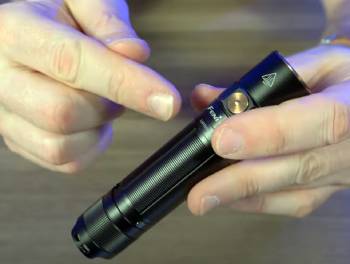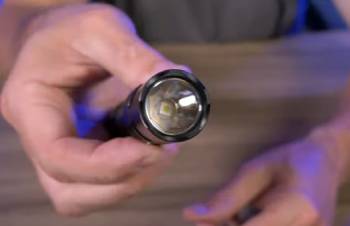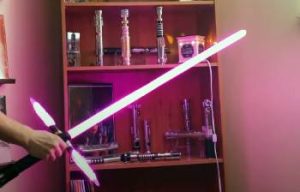Once upon a time, in the mystical world of flashlights, there were two champions of illumination: Fenix E35 and PD35. These two powerful torches reigned supreme, each with its own legion of loyal fans.
Today, we are going to embark on a thrilling journey to explore the depths of the battle between the Fenix E35 and PD35, their unique features, and the questions that arise when comparing these two titans.
A Brief Comparison Table
| Feature | Fenix E35 | Fenix PD35 |
| Max Output | 3000 lumens | 1700 lumens |
| Beam Distance | 240 meters | 335 meters |
| Light Modes | 5 + Strobe | 5 + Strobe |
| Waterproof Rating | IPX8 | IPX8 |
| Length | 4.65 inches | 5.4 inches |
| Weight (without battery) | 3.1 ounces | 3.1 ounces |
| Battery Compatibility | 21700 Li-ion | 18650 Li-ion or two CR123A |
| Body Material | Aluminum alloy | Aircraft-grade aluminum |
| Finish | Hard-anodized anti-abrasive | Hard-anodized anti-abrasive |
| Momentary-on | No | Yes |
| Tail Switch | No | Yes |
| Pocket Clip | No | Yes |
| Price | Generally lower | Generally higher |
The Story of the Fenix E35

The Fenix E35 is a compact, powerful, and versatile flashlight. Designed for everyday carry (EDC), outdoor enthusiasts, and emergency situations, the E35 is a reliable companion for those who require a reliable source of light.
Pros of the Fenix E35
- Compact and Lightweight Design
The Fenix E35 is incredibly compact, measuring just 4.65 inches in length and weighing a mere 3.1 ounces. This lightweight design makes it ideal for EDC and prolonged use without causing fatigue.
- Impressive Output
With a maximum output of 3000 lumens, the E35 packs a punch. This powerful output ensures you’ll have plenty of light, whether you’re exploring the great outdoors or finding your way through a power outage.
- Versatility
The Fenix E35 offers five brightness levels, ranging from a low 50 lumens up to its maximum 3000 lumens. Additionally, it features a strobe mode, making it adaptable for various situations.
Cons of the Fenix E35
- Shorter Battery Life
While the E35’s powerful output is impressive, it comes at a cost. The battery life is shorter than that of the PD35, which means you may need to recharge more frequently.
- Limited Beam Distance
The E35’s beam distance maxes out at 240 meters, which, while still respectable, falls short of the PD35’s reach.
Read More: About Ketra Lighting
The Legend of the Fenix PD35

The Fenix PD35 is another popular flashlight designed for both EDC and tactical use. With its robust construction and powerful output, the PD35 is a force to be reckoned with.
Pros of the Fenix PD35
- Robust and Durable
The PD35 is built to withstand tough conditions, with its aircraft-grade aluminum body and hard-anodized anti-abrasive finish. It is also IPX8-rated for water resistance, which means it can be submerged in water without sustaining damage.
- Impressive Beam Distance
With a maximum beam distance of 335 meters, the PD35 can project light significantly further than the E35, making it an excellent choice for those who need a longer reach.
- Tactical Features
Designed with tactical users in mind, the PD35 features a momentary-on function, a tail switch for quick access to different modes, and a pocket clip for easy carry.
Cons of the Fenix PD35
- Slightly Larger and Heavier
The PD35 is a bit larger and heavier than the E35, measuring 5.4 inches in length and weighing 3.1 ounces (without battery). While this difference is not huge, it may be a factor for those looking for a smaller EDC flashlight.
- Lower Maximum Output
The PD35’s maximum output is 1700 lumens, which is lower than the E35’s 3000 lumens. However, it’s still more than enough for most situations.
Read More: Comparison Between Kolari Vision And LifePixel Infrared Camera
Frequently Asked Questions (FAQs)
Both flashlights are suitable for everyday carry, but the E35 is more compact and lightweight, making it a more comfortable option for EDC. However, the PD35 has some tactical features and a more robust design, which might appeal to certain users.
Both flashlights are great for outdoor activities, but the E35 has a higher maximum output, which can be beneficial when navigating darker environments. On the other hand, the PD35 has a longer beam distance and a more durable design, which might be preferable for some outdoor enthusiasts.
The PD35 generally has better battery life than the E35, particularly when used at lower output levels. However, the difference in battery life may not be significant enough to sway your decision, depending on your specific needs and preferences.
Both flashlights are IPX8-rated for water resistance, which means they can be submerged in water up to 2 meters without sustaining damage. This makes them suitable for use in wet conditions or even during water-based activities.
Yes, both the E35 and PD35 are compatible with rechargeable batteries. The E35 uses a 21700 Li-ion battery, while the PD35 can use either an 18650 Li-ion battery or two CR123A batteries. Rechargeable options are available for both battery types.
The price of both flashlights may vary depending on the retailer and any promotions or discounts available. Generally, the E35 tends to be more affordable than the PD35, but it’s always a good idea to shop around for the best deal.
The Final Verdict
In the end, the choice between the Fenix E35 and PD35 comes down to personal preference and specific needs. The E35 offers a more compact design, higher output, and a lower price, making it an excellent option for everyday carry and general use. Meanwhile, the PD35 boasts a more durable construction, longer beam distance, and tactical features, which may appeal to those who require a more robust flashlight for demanding situations.
Ultimately, both the Fenix E35 and PD35 are high-quality, reliable flashlights that cater to different users and situations. Whether you’re a casual flashlight enthusiast, an outdoor adventurer, or a tactical professional, either of these flashlights is sure to light up your world and help you conquer the darkness.



